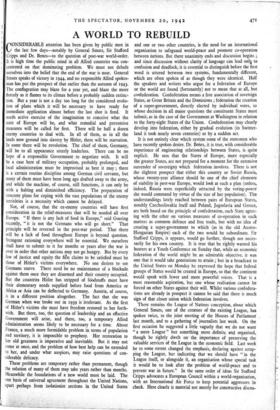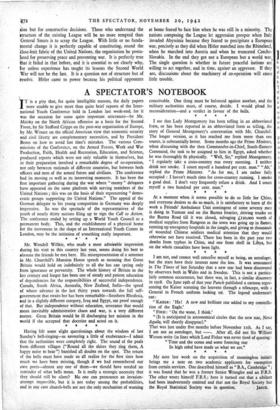A WORLD TO REBUILD C ONSIDERABLE attention has been given by
public men in the last few days—notably by General Smuts, Sir Stafford Cripps and Dr. Benes—to the question of post-war world-order. It is high time the public mind in all Allied countries was con- centrated on that dominating problem. We must not delude ourselves into the belief that the end of the war is near. General Smuts speaks of victory in 1944, and no responsible Allied spokes- man has put the prospect of that earlier than the autumn of 1943. The conflagration may blaze for a year yet, and blaze the more fiercely as it flames to its climax before a probably sudden extinc- tion. But a year is not a day too long for the considered evolu- tion of plans which it will be necessary to have ready for immediate application almost before the last shot is fired. It needs active exercise of the imagination to conceive what the state of Europe will be, and what remedial and preventive measures will be called for first. There will be half a dozen enemy countries to deal with. In all of them, as in all the lands now ground into slavery by Hitler, there will be starvation. In some there will be revolution. The chief of them, Germany, will be to all appearance utterly leaderless. There can be no hope of a responsible Government to negotiate with. It will be a case here of military occupation, probably prolonged, and local administration must be improvised as best it may ; there is a certain routine discipline among German civil servants, but many of them must have been long ago drafted away to the army, and while the machine, of course, still functions, it can only be with a halting and diminished efficiency. The preparation of concrete plans for coping with the vast populations of the enemy territories is a necessity which cannot be delayed.
Not, of course, that the ex-enemy countries will have first consideration in the relief-measures that will be needed all over Europe. " If there is any lack of food in Europe," said Goering recently, " it is not the Germans who will go short." That principle will be reversed in the post-war period. That there will be a lack of food throughout Europe is beyond question. Stringent rationing everywhere will be essential. We ourselves shall have to submit to it for months or years after the war is over in order that other nations may not go hungry. But by every law of justice and equity the first claims to be satisfied must be those of Hitler's victims everywhere. No one desires to• see Germans starve. There need be no maintenance of a blockade against them once they are disarmed and their country occupied. But the countries Hitler has stripped of f6odstuffs must have their elementary needs supplied before food from America or Africa or Asia can be deflected to Germany. Austria, of course, is in a different position altogether. The fact that she was German when war broke out in 1939 is irrelevant. As the first of Hitler's victims she must have freedom restored to her forth- with. But there, too, the question of leadership and an effective Government will arise, and there, too, a temporary Allied administration seems likely to be necessary for a time. About France, a much more formidable problem in terms of population and territory, it is impossible to prophesy. Her restoration to her old greatness is imperative and inevitable. But it may not come at once, and the problem of how best help can be extended to her, and under what auspices, may raise questions of con- siderable delicacy.
These problems are temporary rather than permanent, though the solution of many of them may take years rather than months. Meanwhile the foundations of a new world must be laid. The one basis of universal agreement throughout the United Nations, apart perhaps from isolationist sections in the United States and one or two other countries, is the need for an international organisation to safeguard world-peace and promote co-operation between nations. But there unanimity ends and discussion begins ; and since discussion without clarity of language can lead only to confusion and deadlock, it is essential to distinguish before the first word is uttered between two systems, fundamentally different, which are often spoken of as though they were identical. Half the speakers and writers who argue for a federation of Europe or the world are found (fortunately) not to mean that at all, but confederation. Confederation means a free association of sovereign States, as Great Britain and the Dominions ; federation the creation of a super-government, directly elected by individual votes, to whose decision in all major questions the constituent States must submit, as in the case of the Government at Washington in relation to the forty-eight States of the Union. Confederation may clearly develop into federation, either by gradual evolution (in Switzer- land it took nearly seven centuries) or by a sudden act.
It is not entirely clear which system some of the statesmen who have recently spoken desire. Dr. Berms, it is true, with considerable experience of engineering relationships between States, is quite explicit. He sees that the States of Europe, more especially the greater States, are not prepared for a moment for the extensive surrender of sovereigny which federation involves. There is not the slightest prospect that either this country or Soviet Russia, whose twenty-year alliance should be one of the chief elements of stability in post-war Europe, would look at such a plan (unless, indeed, Russia were superficially attracted by the voting-power she would command by virtue of the size of her population). The understandings lately reached between pairs of European States, notably Czechoslovakia itself and Poland, Jugoslavia and Greece, are both based on the principle of confederation, each State agree- ing with the other on various measures of co-operation in such matters as common defence and free trade, but with no idea of creating a super-government to which (as in the old Austro- Hungarian Empire) each of the two would be subordinate. Sir Stafford Cripps, it appears, would go further, though not neces- sarily for his own country. It is true that he rightly warned his hearers at a Youth Conference on Sunday that, while an economic federation of the world might be an admirable objective, it was one that it would take generations to attain ; but in a broadcast to the United States on Monday he expressed the hope that federal groups of States would be created in Europe, so that the continent would speak with fewer and more powerful voices. That is a most reasonable aspiration, but one whose realisation cannot be forced on other States against their will. Whilst various confedera- tions are already in prospect it cannot be said that there is much sign of that closer union which federation involves.
There remains the League of Nations conception, about which General Smuts, one of the creators of the existing League, has spoken twice, to the joint meeting of the Houses of Parliament last month, and to a gathering of journalists last week. On the first occasion he suggested a little vaguely that we do not want " a mere League " but something more definite and organised, though he rightly dwelt on- the importance of preserving the valuable services of the League in the economic field. Last week he to some extent changed the emphasis, declaring against scrap- ping the League, but indicating that we should have " in the League itself, or alongside it, an organisation whose special task it would be to look after the problem of world-peace and to prevent war in future." In the same order of ideas Sir Stafford Cripps advocates a European Council within a world-organisation, with an International Air Force to keep potential aggressors in check. Here clearly is material not merely for constructive discus- sion but for constructive decisions. Those who understand the structure of the existing League will be no more tempted than General Smuts is to scrap the League. With little or no funda- mental change it is perfectly capable of constituting, round the Close-knit fabric of the United Nations, the organisation he postu- lated for preserving peace and preventing war. It is perfectly true 'that it failed in that before, and it is essential to see clearly why, • for unless experience has taught its lessons the Second World .War will not be the last. It is a question not of structure but of resolve. Hitler came to power because his political opponents at home feared Ito face him when he was still in a minority. The nations composing the League let aggression prosper when Italy invaded Abyssinia because they feared to precipitate a European war, precisely as they did when Hitler marched into the Rhineland, when he marched into Austria and when he truncated Czecho- Slovakia. In the end they got not a European but a world war.. The single question is whether in future peaceful 'nations are willing to act together, and in time, against an aggressor. If they are, discussions about the machinery of co-operation will cause little trouble.



























 Previous page
Previous page